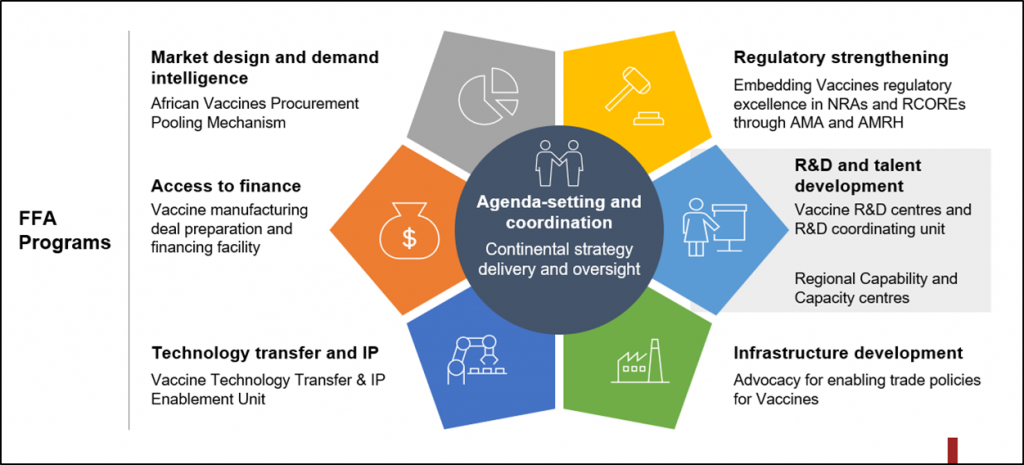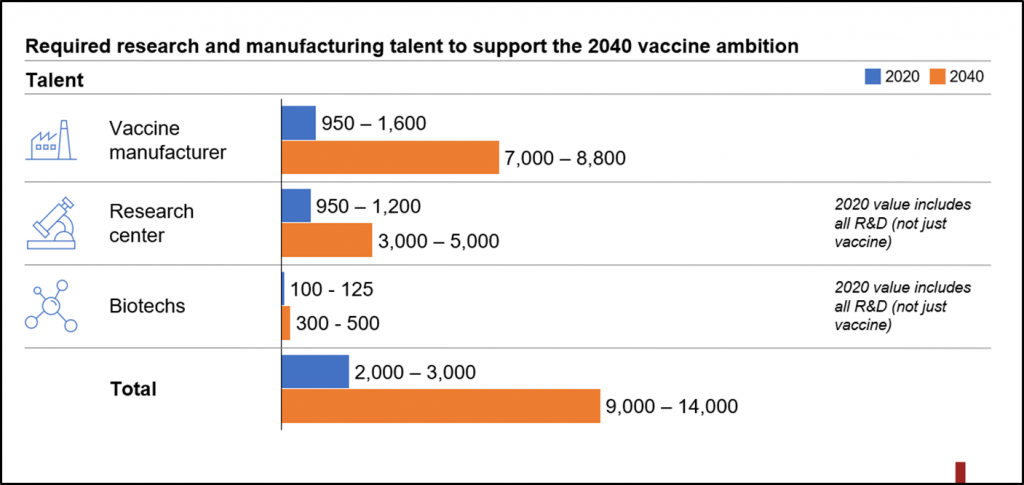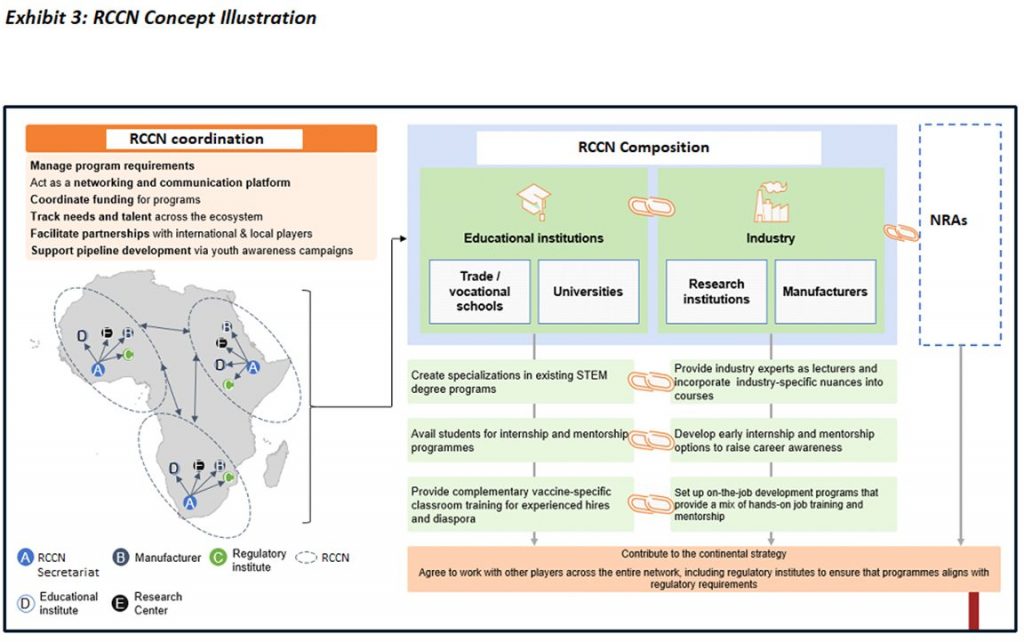- Background
In 2021, The Partnerships for African Vaccine Manufacturing (PAVM) was established within the Africa CDC by the African Union (AU) to meet its goal to produce 60% of the vaccines administered on the continent locally by 2040. In March 2022, the PAVM published the Framework for Action to detail the approach through which the AU’s goal would be attained. This culminated in the establishment of eight bold programs [Exhibit 1], including R&D and talent development[1]. [1] PAVM Framework-for-Action
Exhibit 1: FFA bold programs

The R&D and talent development bold programmes are now independent as opposed to the initial establishment. Africa needs a skilled workforce to support the vaccine manufacturing ecosystem if it is to fulfil the 2040 goal. To this end, the PAVM will create Regional Capability and Capacity Networks (RCCNs) to support the development and establishment of sustainable workforce development programmes for the vaccine manufacturing ecosystem.
The RCCNs will comprise partnerships between training providers (local universities and technical & vocational training (TEVET) institutions), manufacturers, research and development (R&D) organizations, and national regulatory authorities (NRAs). The RCCNs will implement training initiatives to achieve three core objectives: build and maintain a skilled biomanufacturing, R&D, and regulatory affairs workforce to enable vaccine manufacturing and R&D on the continent at scale as per the developed Vaccine R&D and Vaccine Manufacturing Competency Frameworks – Africa CDC; implement the recommended Business and Operational Models for African Biomanufacturing Training Initiatives – Africa CDC; and incentivize vaccine R&D activities in Africa.
According to an expert analysis and survey of manufacturers on the African continent, 12 plants from 3 countries (China, India, Korea), conducted by McKinsey in 2021, Africa currently manufactures ~1 billion vaccine doses and has ~2,000-3,000 FTEs employed in vaccine research and development and manufacturing positions as of 2020. The study estimated that to meet the AU’s ambition of producing ~2.7 billion doses by 2040, ~9,000-14,000 FTEs are needed [Exhibit 2].
Exhibit 2: Research and manufacturing FTE requirements, 2020 (existing) vs 2040 (forecast)

The RCCNs will operate through a network model which will be representative of the different regions in Africa. [Exhibit 3].

Africa CDC requests proposals to establish and operationalize RCCNs across the continent to respond to short-, mid-, and long-term Africa’s vaccine manufacturing talent needs.
- Objectives and Activities
The RCCNs have three main objectives, across which it will implement multiple initiatives [Table 1]:
- Establish and operate sustainable training programmes to build and maintain a skilled workforce for the vaccine manufacturing ecosystem in the regions and the continent.
- Increase the relevance of sustainably funded training and educational programs to evolving industry needs.
- Incentivize R&D activities across Africa.
Table 1: Examples of RCCCN initiatives
| Objective | Initiative(s) |
| Establish and operate sustainable training programmes to build and maintain a skilled workforce for the vaccine manufacturing ecosystem in the regions and the continent | – Conduct and update comprehensive training needs assessments – Establish fellowship programs in vaccine manufacturing, Research and Development, and regulatory affairs – Establish specialized STEM programmes (Bachelors/MSc) in universities to support the vaccine manufacturing ecosystem in Africa – Establish structured internship programmes for STEM graduates to increase levels of preparedness for industry – Create on-the-job development programs for professionals to increase employee motivation – Establish TOT programmes and staff development programmes to upskill existing staff – Establish scholarship programmes for vaccine manufacturing ecosystem professionals for university programs (Bachelors/ MSC) as an incentive to increase student recruitment – Develop diaspora talent return programs (with attractive incentives for highly skilled professionals) |
| Increase the relevance of sustainably funded training and educational programs to evolving industry needs | – Promote establishment of organograms promoted by the developed competency frameworks for both manufacturing and research and development – Carrying out continuous training needs assessments – Customize and update training curricula to industry needs in line with best practices – Create university networks to enrich the STEM specializations/ novel degree programs |
| Incentivize R&D activities across Africa | – Create a link between R&D and commercialization – Create R&D job placement programs |
3. RCCN Selection Process
To select the RCCNs, the Africa CDC will publish a request for proposals to establish and operationalize RCCNs. The selection criteria will be as shown in Annex 1 and is based on five key dimensions (core business, regional focus, leadership, innovation, and financial) identified as important for the successful implementation of RCCN activities. The criteria also identify key performance areas within the dimensions and the evidence that must be shown to support the award of scores. An independent expert peer review committee (IEPRC) will be constituted by Africa CDC to evaluate the proposals and rate them using the scoring criteria shown in Annex 2. The scoring criteria provides the definitions of how scores will be allocated based on the results of the assessment of the key performance areas and evidence provided. In addition to the set selection criteria, the proposals will be assessed on the following:
- Excellence of the training programs
- Development plans of highly qualified personnel
- Networking and partnerships
- Knowledge and technology exchange and exploitation
- Management of the Network
- Sustainable financing plan
How to apply
Applications should be submitted via the following link: https://tools.africacdc.org/africacdcrc/surveys/?s=H7L7Y7CDH98CH4KJ
For any querie, Kindly contact: Dr. Chiluba Mwila: mwilac@africacdc.org
IMPORTANT DATES
Deadline for Application: 31st July 2024
Africa CDC welcomes applications from all qualified institutions from all AU regions.
